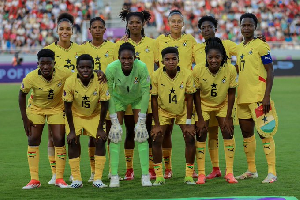Accra, Dec. 20, GNA - Professor Sakyi Awuku Amoa, Director General of Ghana AIDS Commission (GAC), on Wednesday bemoaned the upsurge of stigmatization of health professionals working in the area of HIV/AIDS by their own colleagues.
The attitude, he said, was unfortunate and attributed it to ignorance and irresponsible behaviours on the part of those health professionals.
Prof. Amoa was responding to comments at a day's Policy Dialogue Meeting on HIV/AIDS in Accra. The meeting brought together stakeholders to address the burden of HIV/AIDS.
It was also to identify new and emerging issues pertaining to HIV/AIDS in the health sector; the impact of scaling up interventions on human resources; identify health services that were most severely affected by HIV/AIDS and identify avenues for collaboration in the health sector in rolling out a comprehensive HIV/AIDS treatment and care system.
Prof. Amoa noted that reduction of stigmatization and discrimination at health facilities were the biggest challenge facing the Commission and called on health professionals "whom I believe should have known better and even lead this campaign=94, to desist from that negative attitude and to help educate the people to reduce the stigma. He called for strengthened relationship between the Commission and the Ministry of Health (MOH) on policy issues for national response, taking into account the unfavourable policies that were largely responsible for the low coverage of services.
"We need to review operational polices, specific policies, plans, proposals and procedures. Currently, there are no existing systems to review these operational polices."
Prof. Amoa noted that it was important to strengthen linkages between research, policies and programmes, adding: "This is an area that the Health Ministry through the Health Research Unit may need to look at in respect of their roles and the implications of their input to the research agenda."
Dr Margaret Lartey of University of Ghana Medical School (UGMS) at the Korle-Bu Teaching Hospital expressed regret about the uncooperative attitude of the Hospital on HIV programmes as it was considered as 93non-income generating".
She mentioned inadequate support for management information systems at clinics and pharmacy and stigmatization of health professionals involved in clinical care programme as some of the major challenges facing health professionals working in the area of HIV/AIDS. Dr Lartey suggested the need for the Hospital to have HIV budget line and to show more commitment to the programme; invite tertiary institutions to submit proposals to be included in the global fund and support for tertiary institutions especially from organizations such as the GAC, MOH and its partners as the way forward.
Dr Adrian Oddoye of the Akai House Clinic, who gave the management of HIV/AIDS patients from the private sector perspective, outlined high cost of antiretroviral drugs; high cost of laboratory tests; lack of home visits; follow-ups and partner notification as some of the challenges facing the private sector.
He recommended further capacity building and additional pertinent laboratory tests and services and the involvement of the private sector in HIV/AIDS prevention activities. 20 Dec. 06
Health News of Wednesday, 20 December 2006
Source: GNA












